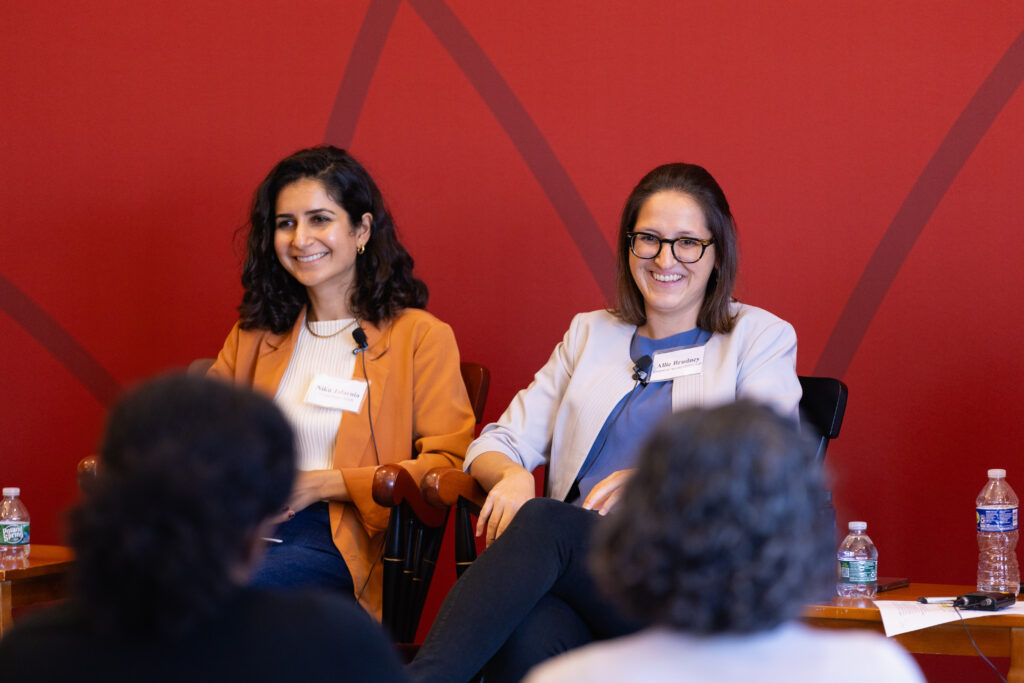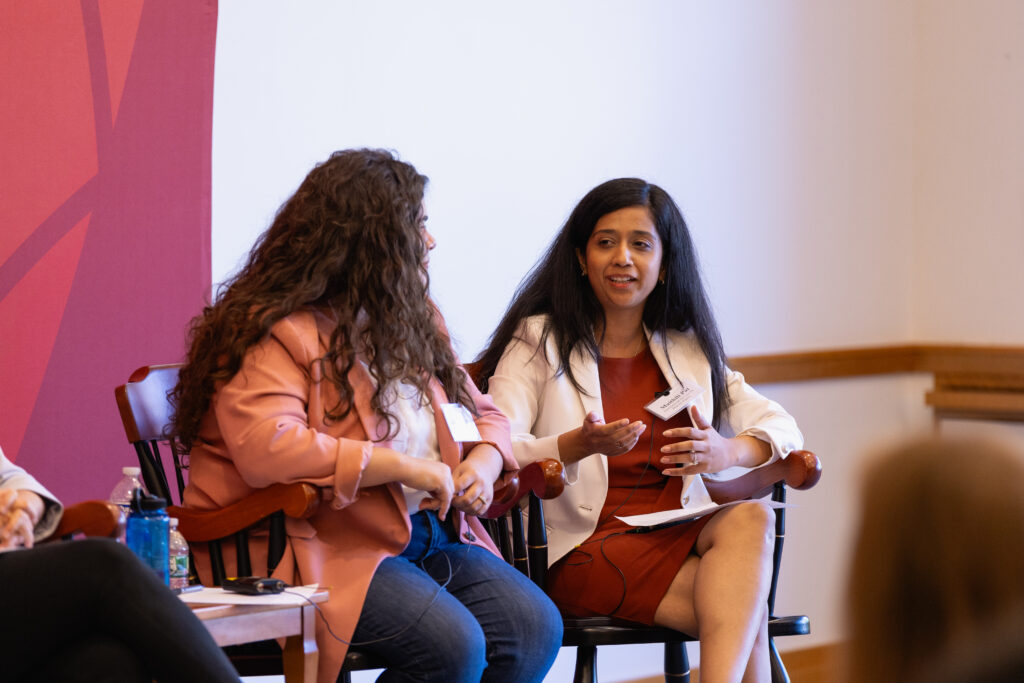A group of recent Clinic alumni whose careers span human rights litigation, documentation, research, and advocacy returned to campus and shared their insights with current students during a panel discussion in September. The panel, titled “Jumping into Human Rights Practice: Recent Alumni Reflect on a Shifting Field” featured:
- Allie Brudney (JD ’19), a Senior Staff Attorney at Corporate Accountability Lab;
- Lindsay Bailey (JD ’19), a Staff Attorney at the Center for Justice and Accountability;
- Niku Jafarnia (JD ’20), the Bahrain and Yemen Researcher at Human Rights Watch and;
- Maithili Pai (LLM ’20), the UN Advocate at International Service for Human Rights.
Daniel Levine-Spound (JD ’19), Clinical Teaching Fellow and Lecturer on Law at Harvard Law School, moderated the discussion.
The panelists began by discussing key emerging issues, questions, and approaches in the field. Pai noted an increasing focus on technology and human rights, climate change litigation, and legal accountability for non-state actors. She added that the institutions which implement international law and legal frameworks, such as the United Nations, require greater attention and transparency. Pai explained that it is critical for the U.N. to “really serve the people and not just the interests of the people that happen to be at the table” in New York and Geneva.


Bailey emphasized the need for nongovernmental organizations in the global north to complement the work of local partners and communities in the global south. “I think people increasingly are seeing global north organizations as people who can facilitate the work of groups in the global south. . . . That’s something you can see in the way the Clinic projects work,” she said.
Jafarnia echoed that point, adding that Human Rights Watch has “the opportunity to utilize our space and privilege and the attention we can get on our work to draw upon what people in Yemen and local organizations are calling for and be used as a tool by them. . . . There’s a much more synergistic relationship where it’s like, ‘you tell us what you want us to be working on and we will try to effectively advocate for that.’”
Regarding corporate accountability, Brudney explained that the European Union could provide a promising forum for litigation efforts given the recent passage of the Corporate Sustainability Due Diligence Directive in July 2024. The Directive requires companies to take responsibility for negative human rights and environmental impacts associated with their activities. “What we see is that organizations are starting to work more cross jurisdictionally,” Brudney noted. “Where is the harm actually taking place? Let’s work with partners there.”
The panelists also reflected on how their time in the Clinic has influenced the early years of their careers. For Jafarnia, a fact-finding project in Kenya as a clinical student prepared her incredibly well for her current role as a researcher. The Clinic offered “a great way to experience [fact-finding and interviewing] and see how it goes in a much more controlled, supported setting,” she noted.

For Brudney, the Clinic provided experience with report writing as well as training in project management through Harvard Law School Advocates for Human Rights. “Figuring out, how am I getting from A to B? Who am I talking to? How am I giving different people different projects and assignments? Learning how to do that as a student was just incredibly helpful,” she said.
Bailey built two years of extensive litigation experience through the Clinic, putting her in an excellent position to contribute immediately and meaningfully to complex cases. The practices she learned in the Clinic also helped her become a stronger mentor while serving as a Supervising Attorney and Clinical Teaching Fellow at Georgetown’s Environmental Law and Justice Clinic.
Pai explained that as an LLM student, the Clinic pushed her outside her comfort zone through exercises such as a media advocacy simulation. She added that the clinical model taught her what successful experiential learning and education can look like: “A lot of us come from jurisdictions where clinics are either non-existent or very nascent as a method of teaching and experiential learning,” Pai said. “I think the relationships that you build through the Clinic with supervisors, not just the ones that are supervising your project immediately, and also other students, is something that I cherish so much.”


WATCH: Jumping into Human Rights Practive” Recent Alumni Reflect on a Shifting Field
Paras Shah (@pshah518) is a Legal Editor at Just Security and an Adjunct Professor of Law at NYU. He is a graduate of the University of California, Berkeley and Harvard Law School where he spent two years in the International Human Rights Clinic and served as an Executive Article Editor for the Harvard Human Rights Journal.